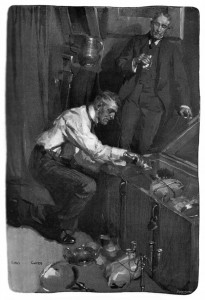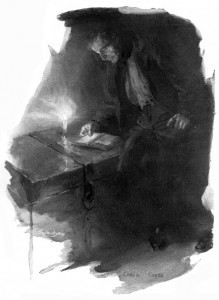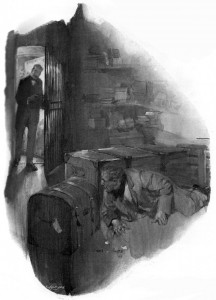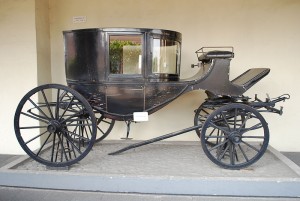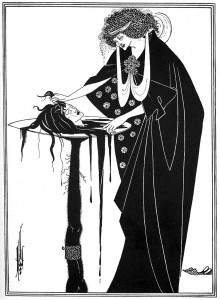This story was first published in the US in Collier’s Weekly in the January 21, 1905 issue, and in the February 1905 issue of Pall Mall Magazine in the UK.
Like all the tribe of which I held him head, Raffles professed the liveliest disdain for unwieldy plunder of any description; it might be old Sheffield1, or it might be solid silver or gold, but if the thing was not to be concealed about the person, he would none whatever of it. Unlike the rest of us, however, in this as in all else, Raffles would not infrequently allow the acquisitive spirit of the mere collector to silence the dictates of professional prudence. The old oak chests, and even the mahogany wine-cooler, for which he had doubtless paid like an honest citizen, were thus immovable with pieces of crested plate2, which he had neither the temerity to use nor the hardihood to melt or sell. He could but gloat over them behind locked doors, as I used to tell him, and at last one afternoon I caught him at it. It was in the year after that of my novitiate, a halcyon3 period at the Albany, when Raffles left no crib uncracked, and I played second-murderer4 every time. I had called in response to a telegram in which he stated that he was going out of town, and must say good-by to me before he went. And I could only think that he was inspired by the same impulse toward the bronzed salvers5 and the tarnished teapots with which I found him surrounded, until my eyes lit upon the enormous silver-chest into which he was fitting them one by one.
“Allow me, Bunny! I shall take the liberty of locking both doors behind you and putting the key in my pocket,” said Raffles, when he had let me in. “Not that I mean to take you prisoner, my dear fellow; but there are those of us who can turn keys from the outside, though it was never an accomplishment of mine.”
“Not Crawshay again?” I cried, standing still in my hat.
Raffles regarded me with that tantalizing smile of his which might mean nothing, yet which often meant so much; and in a flash I was convinced that our most jealous enemy and dangerous rival, the doyen of an older school, had paid him yet another visit.
“That remains to be seen,” was the measured reply; “and I for one have not set naked eye on the fellow since I saw him off through that window and left myself for dead on this very spot. In fact, I imagined him comfortably back in jail.”
“Not old Crawshay!” said I. “He’s far too good a man to be taken twice. I should call him the very prince of professional cracksmen.”
“Should you?” said Raffles coldly, with as cold an eye looking into mine. “Then you had better prepare to repel princes when I’m gone.”
“But gone where?” I asked, finding a corner for my hat and coat, and helping myself to the comforts of the venerable dresser which was one of our friend’s greatest treasures. “Where is it you are off to, and why are you taking this herd of white elephants with you?”
Raffles bestowed the cachet of his smile on my description of his motley plate. He joined me in one of his favorite cigarettes, only shaking a superior head at his own decanter.
“One question at a time, Bunny,” said he. “In the first place, I am going to have these rooms freshened up with a potful of paint, the electric light, and the telephone6 you’ve been at me about so long.”
“Good!” I cried. “Then we shall be able to talk to each other day and night!”
“And get overheard and run in for our pains? I shall wait till you are run in, I think,” said Raffles cruelly. “But the rest’s a necessity: not that I love new paint or am pining for electric light, but for reasons which I will just breathe in your private ear, Bunny. You must not try to take them too seriously; but the fact is, there is just the least bit of a twitter against me in this rookery7 of an Albany. It must have been started by that tame old bird, Policeman Mackenzie; it isn’t very bad as yet, but it needn’t be that to reach my ears. Well, it was open to me either to clear out altogether, and so confirm whatever happened to be in the air, or to go off for a time, under some arrangement which would give the authorities ample excuse for overhauling every inch of my rooms. Which would you have done, Bunny?”
“Cleared out, while I could!” said I devoutly.
“So I should have thought,” rejoined Raffles. “Yet you see the merit of my plan. I shall leave every mortal thing unlocked.”
“Except that,” said I, kicking the huge oak case with the iron bands and clamps, and the baize lining fast disappearing under heavy packages bearing the shapes of urns and candelabra.
“That,” replied Raffles, “is neither to go with me nor to remain here.”
“Then what do you propose to do with it?”
“You have your banking account, and your banker,” he went on. This was perfectly true, though it was Raffles alone who had kept the one open, and enabled me to propitiate the other in moments of emergency.8
“Well?”
“Well, pay in this bundle of notes this afternoon, and say you have had a great week at Liverpool and Lincoln9; then ask them if they can do with your silver while you run over to Paris for a merry Easter. I should tell them it’s rather heavy—a lot of old family stuff that you’ve a good mind to leave with them till you marry and settle down.”
I winced at this, but consented to the rest after a moment’s consideration. After all, and for more reasons that I need enumerate, it was a plausible tale enough. And Raffles had no banker; it was quite impossible for him to explain, across any single counter, the large sums of hard cash which did sometimes fall into his hands; and it might well be that he had nursed my small account in view of the very quandary which had now arisen. On all grounds, it was impossible for me to refuse him, and I am still glad to remember that my assent was given, on the whole, ungrudgingly.
“But when will the chest be ready for me,” I merely asked, as I stuffed the notes into my cigarette case. “And how are we to get it out of this, in banking hours, without attracting any amount of attention at this end?”
Raffles gave me an approving nod.
“I’m glad to see you spot the crux so quickly, Bunny. I have thought of your taking it round to your place first, under cloud of night; but we are bound to be seen even so, and on the whole it would look far less suspicious in broad daylight. It will take you some twelve or fifteen minutes to drive to your bank in a growler10, so if you are here with one at a quarter to ten to-morrow morning, that will exactly meet the case. But you must have a hansom this minute if you mean to prepare the way with those notes this afternoon!”
It was only too like the Raffles of those days to dismiss a subject and myself in the same breath, with a sudden nod, and a brief grasp of the hand he was already holding out for mine. I had a great mind to take another of his cigarettes instead, for there were one or two points on which he had carefully omitted to enlighten me. Thus, I had still to learn the bare direction of his journey; and it was all that I could do to drag it from him as I stood buttoning my coat and gloves.
“Scotland,” he vouchsafed at last.
“At Easter,” I remarked.
“To learn the language,” he explained. “I have no tongue but my own, you see, but I try to make up for it by cultivating every shade of that. Some of them have come in useful even to your knowledge, Bunny: what price my Cockney that night in St. John’s Wood? I can keep up my end in stage Irish, real Devonshire, very fair Norfolk, and three distinct Yorkshire dialects. But my good Galloway Scots might be better, and I mean to make it so.”
“You still haven’t told me where to write to you.”
“I’ll write to you first, Bunny.”
“At least let me see you off,” I urged at the door. “I promise not to look at your ticket if you tell me the train!”
“The eleven-fifty from Euston.”
“Then I’ll be with you by quarter to ten.”
And I left him without further parley, reading his impatience in his face. Everything, to be sure, seemed clear enough without that fuller discussion which I loved and Raffles hated. Yet I thought we might at least have dined together, and in my heart I felt just the least bit hurt, until it occurred to me as I drove to count the notes in my cigarette case. Resentment was impossible after that. The sum ran well into three figures11, and it was plain that Raffles meant me to have a good time in his absence. So I told his lie with unction at my bank, and made due arrangements for the reception of his chest next morning. Then I repaired to our club, hoping he would drop in, and that we might dine together after all. In that I was disappointed. It was nothing, however, to the disappointment awaiting me at the Albany, when I arrived in my four-wheeler at the appointed hour next morning.
“Mr. Raffles ‘as gawn, sir,” said the porter, with a note of reproach in his confidential undertone. The man was a favorite with Raffles, who used him and tipped him with consummate tact, and he knew me only less well.
“Gone!” I echoed aghast. “Where on earth to?”
“Scotland, sir.”
“Already?”
“By the eleven-fifty lawst night.”
“Last night! I thought he meant eleven-fifty this morning!”
“He knew you did, sir, when you never came, and he told me to tell you there was no such train.”
I could have rent my garments in mortification and annoyance with myself and Raffles. It was as much his fault as mine. But for his indecent haste in getting rid of me, his characteristic abruptness at the end, there would have been no misunderstanding or mistake.
“Any other message?” I inquired morosely.
“Only about the box, sir. Mr. Raffles said as you was goin’ to take chawge of it time he’s away, and I’ve a friend ready to lend a ‘and in getting it on the cab. It’s a rare ‘eavy ‘un, but Mr. Raffles an’ me could lift it all right between us, so I dessay me an’ my friend can.”
For my own part, I must confess that its weight concerned me less than the vast size of that infernal chest, as I drove with it past club and park at ten o’clock in the morning. Sit as far back as I might in the four-wheeler, I could conceal neither myself nor my connection with the huge iron-clamped case upon the roof: in my heated imagination its wood was glass through which all the world could see the guilty contents. Once an officious constable held up the traffic at our approach, and for a moment I put a blood-curdling construction upon the simple ceremony. Low12 boys shouted after us—or if it was not after us, I thought it was—and that their cry was “Stop thief!” Enough said of one of the most unpleasant cab-drives I ever had in my life. Horresco referens13.
At the bank, however, thanks to the foresight and liberality of Raffles, all was smooth water. I paid my cabman handsomely, gave a florin14 to the stout fellow in livery whom he helped with the chest, and could have pressed gold upon the genial clerk who laughed like a gentleman at my jokes about the Liverpool winners and the latest betting on the Family Plate. I was only disconcerted when he informed me that the bank gave no receipts for deposits of this nature. I am now aware that few London banks do. But it is pleasing to believe that at the time I looked—what I felt—as though all I valued upon earth were in jeopardy.
I should have got through the rest of that day happily enough, such was the load off my mind and hands, but for an extraordinary and most disconcerting note received late at night from Raffles himself. He was a man who telegraphed freely, but seldom wrote a letter. Sometimes, however, he sent a scribbled line by special messenger; and overnight, evidently in the train, he had scribbled this one to post in the small hours at Crewe:
“‘Ware Prince of Professors! He was in the offing when I left. If slightest cause for uneasiness about bank, withdraw at once and keep in own rooms like good chap,
“A. J. R.
“P. S.—Other reasons, as you shall hear.”
There was a nice nightcap for a puzzled head! I had made rather an evening of it, what with increase of funds and decrease of anxiety, but this cryptic admonition spoiled the remainder of my night. It had arrived by a late post, and I only wished that I had left it all night in my letter-box. What exactly did it mean? And what exactly must I do? These were questions that confronted me with fresh force in the morning.
The news of Crawshay did not surprise me. I was quite sure that Raffles had been given good reason to bear him in mind before his journey, even if he had not again beheld the ruffian in the flesh. That ruffian and that journey might be more intimately connected than I had yet supposed. Raffles never told me all. Yet the solid fact held good—held better than ever—that I had seen his plunder safely planted in my bank. Crawshay himself could not follow it there. I was certain he had not followed my cab; in the acute self-consciousness induced by that abominable drive, I should have known it in my bones if he had. I thought of the porter’s friend who had helped me with the chest. No, I remember him as well as I remembered Crawshay; they were quite different types.
To remove that vile box from the bank, on top of another cab, with no stronger pretext and no further instructions, was not to be thought of for a moment. Yet I did think of it, for hours. I was always anxious to do my part by Raffles; he had done more than his by me, not once or twice, to-day or yesterday, but again and again from the very first. I need not state the obvious reasons I had for fighting shy of the personal custody of his accursed chest. Yet he had run worse risks for me, and I wanted him to learn that he, too, could depend on a devotion not unworthy of his own.
In my dilemma I did what I have often done when at a loss for light and leading. I took hardly any lunch, but went to Northumberland Avenue and had a Turkish bath instead15. I know nothing so cleansing to mind as well as body, nothing better calculated to put the finest possible edge on such judgment as one may happen to possess. Even Raffles, without an ounce to lose or a nerve to soothe, used to own a sensuous appreciation of the peace of mind and person to be gained in this fashion when all others failed. For me, the fun began before the boots were off one’s feet; the muffled footfalls, the thin sound of the fountain, even the spent swathed forms upon the couches, and the whole clean, warm, idle atmosphere, were so much unction to my simpler soul. The half-hour in the hot-rooms I used to count but a strenuous step to a divine lassitude of limb and accompanying exaltation of intellect. And yet—and yet—it was in the hottest room of all, in a temperature of 270 deg. Fahrenheit, that the bolt fell from the Pall Mall Gazette which I had bought outside the bath.
I was turning over the hot, crisp pages, and positively revelling in my fiery furnace, when the following headlines and leaded paragraphs leapt to my eye with the force of a veritable blow:
BANK ROBBERS IN THE WEST END—
DARING AND MYSTERIOUS CRIME
An audacious burglary and dastardly assault have been committed on the premises of the City and Suburban Bank16 in Sloane Street, W. From the details so far to hand, the robbery appears to have been deliberately planned and adroitly executed in the early hours of this morning.
A night watchman named Fawcett states that between one and two o’clock he heard a slight noise in the neighborhood of the lower strong-room, used as a repository for the plate and other possessions of various customers of the bank. Going down to investigate, he was instantly attacked by a powerful ruffian, who succeeded in felling him to the ground before an alarm could be raised.
Fawcett is unable to furnish any description of his assailant or assailants, but is of opinion that more than one were engaged in the commission of the crime. When the unfortunate man recovered consciousness, no trace of the thieves remained, with the exception of a single candle which had been left burning on the flags of the corridor.
The strong-room, however, had been opened, and it is feared the raid on the chests of plate and other valuables may prove to have been only too successful, in view of the Easter exodus, which the thieves had evidently taken into account. The ordinary banking chambers were not even visited; entry and exit are believed to have been effected through the coal cellar, which is also situated in the basement. Up to the present the police have effected no arrest.
I sat practically paralyzed by this appalling news; and I swear that, even in that incredible temperature, it was a cold perspiration in which I sweltered from head to heel. Crawshay, of course! Crawshay once more upon the track of Raffles and his ill-gotten gains! And once more I blamed Raffles himself: his warning had come too late: he should have wired to me at once not to take the box to the bank at all. He was a madman ever to have invested in so obvious and obtrusive a receptacle for treasure. It would serve Raffles right if that and no other was the box which had been broken into by the thieves.
Yet, when I considered the character of his treasure, I fairly shuddered in my sweat. It was a hoard of criminal relics. Suppose his chest had indeed been rifled, and emptied of every silver thing but one; that one remaining piece of silver, seen of men, was quite enough to cast Raffles into the outer darkness of penal servitude! And Crawshay was capable of it—of perceiving the insidious revenge—of taking it without compunction or remorse.
There was only one course for me. I must follow my instructions to the letter and recover the chest at all hazards, or be taken myself in the attempt. If only Raffles had left me some address, to which I could have wired some word of warning! But it was no use thinking of that; for the rest there was time enough up to four o’clock, and as yet it was not three. I determined to go through with my bath and make the most of it. Might it not be my last for years?
But I was past enjoying even a Turkish bath. I had not the patience for a proper shampoo17, or sufficient spirit for the plunge18. I weighed myself automatically, for that was a matter near my heart; but I forgot to give my man his sixpence until the reproachful intonation of his adieu recalled me to myself. And my couch in the cooling gallery—my favorite couch, in my favorite corner, which I had secured with gusto on coming in—it was a bed of thorns, with hideous visions of a plank-bed to follow!
I ought to be able to add that I heard the burglary discussed on adjacent couches before I left. I certainly listened for it, and was rather disappointed more than once when I had held my breath in vain. But this is the unvarnished record of an odious hour, and it passed without further aggravation from without; only, as I drove to Sloane Street, the news was on all the posters, and on one I read of “a clew” which spelt for me a doom I was grimly resolved to share.
Already there was something in the nature of a “run” up on the Sloane Street branch of the City and Suburban. A cab drove away with a chest of reasonable dimensions as mine drove up, while in the bank itself a lady was making a painful scene. As for the genial clerk who had roared at my jokes the day before, he was mercifully in no mood for any more, but, on the contrary, quite rude to me at sight.
“I’ve been expecting you all the afternoon,” said he. “You needn’t look so pale.”
“Is it safe?”
“That Noah’s Ark of yours? Yes, so I hear; they’d just got to it when they were interrupted, and they never went back again.”
“Then it wasn’t even opened?”
“Only just begun on, I believe.”
“Thank God!”
“You may; we don’t,” growled the clerk. “The manager says he believes your chest was at the bottom of it all.”
“How could it be?” I asked uneasily.
“By being seen on the cab a mile off, and followed,” said the clerk.
“Does the manager want to see me?” I asked boldly.
“Not unless you want to see him,” was the blunt reply. “He’s been at it with others all the afternoon, and they haven’t all got off as cheap as you.”
“Then my silver shall not embarrass you any longer,” said I grandly. “I meant to leave it if it was all right, but after all you have said I certainly shall not. Let your man or men bring up the chest at once. I dare say they also have been ‘at it with others all the afternoon,’ but I shall make this worth their while.”
I did not mind driving through the streets with the thing this time. My present relief was too overwhelming as yet to admit of pangs and fears for the immediate future. No summer sun had ever shone more brightly than that rather watery one of early April. There was a green-and-gold dust of buds and shoots on the trees as we passed the park. I felt greater things sprouting in my heart. Hansoms passed with schoolboys just home for the Easter holidays, four-wheelers19 outward bound, with bicycles and perambulators atop; none that rode in them were half so happy as I, with the great load on my cab, but the greater one off my heart.
At Mount Street it just went into the lift; that was a stroke of luck; and the lift-man and I between us carried it into my flat. It seemed a featherweight to me now. I felt a Samson in the exaltation of that hour. And I will not say what my first act was when I found myself alone with my white elephant in the middle of the room; enough that the siphon was still doing its work when the glass slipped through my fingers to the floor.
“Bunny!”
It was Raffles. Yet for a moment I looked about me quite in vain. He was not at the window; he was not at the open door. And yet Raffles it had been, or at all events his voice, and that bubbling over with fun and satisfaction, be his body where it might. In the end I dropped my eyes, and there was his living face in the middle of the lid of the chest, like that of the saint upon its charger20.
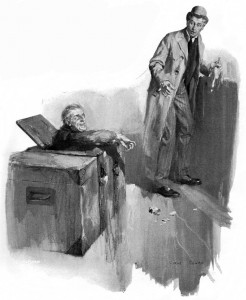
A life-size Jack-in-the-box, he had thrust his head through a lid within the lid.
Illustration by Cyrus Cuneo
But Raffles was alive, Raffles was laughing as though his vocal cords would snap—there was neither tragedy nor illusion in the apparition of Raffles. A life-size Jack-in-the-box, he had thrust his head through a lid within the lid, cut by himself between the two iron bands that ran round the chest like the straps of a portmanteau. He must have been busy at it when I found him pretending to pack, if not far into that night, for it was a very perfect piece of work; and even as I stared without a word, and he crouched laughing in my face, an arm came squeezing out, keys in hand; one was turned in either of the two great padlocks, the whole lid lifted, and out stepped Raffles like the conjurer he was.
“So you were the burglar!” I exclaimed at last. “Well, I am just as glad I didn’t know.”
He had wrung my hand already, but at this he fairly mangled it in his.
“You dear little brick21,” he cried, “that’s the one thing of all things I longed to hear you say! How could you have behaved as you’ve done if you had known? How could any living man? How could you have acted, as the polar star of all the stages could not have acted in your place? Remember that I have heard a lot, and as good as seen as much as I’ve heard. Bunny, I don’t know where you were greatest: at the Albany, here, or at your bank!”
“I don’t know where I was most miserable,” I rejoined, beginning to see the matter in a less perfervid22 light. “I know you don’t credit me with much finesse, but I would undertake to be in the secret and to do quite as well; the only difference would be in my own peace of mind, which, of course, doesn’t count.”
But Raffles wagged away with his most charming and disarming smile; he was in old clothes, rather tattered and torn, and more than a little grimy as to the face and hands, but, on the surface, wonderfully little the worse for his experience. And, as I say, his smile was the smile of the Raffles I loved best.
“You would have done your damnedest, Bunny! There is no limit to your heroism; but you forget the human equation in the pluckiest of the plucky. I couldn’t afford to forget it, Bunny; I couldn’t afford to give a point away. Don’t talk as though I hadn’t trusted you! I trusted my very life to your loyal tenacity. What do you suppose would have happened to me if you had let me rip in that strong-room? Do you think I would ever have crept out and given myself up? Yes, I’ll have a peg for once; the beauty of all laws is in the breaking, even of the kind we make unto ourselves.”
I had a Sullivan for him, too; and in another minute he was spread out on my sofa, stretching his cramped limbs with infinite gusto, a cigarette between his fingers, a yellow bumper23 at hand on the chest of his triumph and my tribulation.
“Never mind when it occurred to me, Bunny; as a matter of fact, it was only the other day, when I had decided to go away for the real reasons I have already given you. I may have made more of them to you than I do in my own mind, but at all events they exist. And I really did want the telephone and the electric light.”
“But where did you stow the silver before you went?”
“Nowhere; it was my luggage—a portmanteau, cricket-bag, and suit-case full of very little else—and by the same token I left the lot at Euston24, and one of us must fetch them this evening.”
“I can do that,” said I. “But did you really go all the way to Crewe?”
“Didn’t you get my note? I went all the way to Crewe to post you those few lines, my dear Bunny! It’s no use taking trouble if you don’t take trouble enough; I wanted you to show the proper set of faces at the bank and elsewhere, and I know you did. Besides, there was an up-train four minutes after mine got in. I simply posted my letter in Crewe station, and changed from one train to the other.”
“At two in the morning!”
“Nearer three, Bunny. It was after seven when I slung in with the Daily Mail. The milk had beaten me by a short can25. But even so I had two very good hours before you were due.”
“And to think,” I murmured, “how you deceived me there!”
“With your own assistance,” said Raffles laughing. “If you had looked it up you would have seen there was no such train in the morning, and I never said there was. But I meant you to be deceived, Bunny, and I won’t say I didn’t—it was all for the sake of the side! Well, when you carted me away with such laudable despatch, I had rather an uncomfortable half-hour, but that was all just then. I had my candle, I had matches, and lots to read. It was quite nice in that strong-room until a very unpleasant incident occurred.”
“Do tell me, my dear fellow!”
“I must have another Sullivan—thank you—and a match. The unpleasant incident was steps outside and a key in the lock! I was disporting myself on the lid of the trunk at the time. I had barely time to knock out my light and slip down behind it. Luckily it was only another box of sorts; a jewel-case, to be more precise; you shall see the contents in a moment. The Easter exodus has done me even better than I dared to hope.”
His words reminded me of the Pall Mall Gazette, which I had brought in my pocket from the Turkish bath. I fished it out, all wrinkled and bloated by the heat of the hottest room, and handed it to Raffles with my thumb upon the leaded paragraphs.
“Delightful!” said he when he had read them. “More thieves than one, and the coal-cellar of all places as a way in! I certainly tried to give it that appearance. I left enough candle-grease there to make those coals burn bravely. But it looked up into a blind backyard, Bunny, and a boy of eight couldn’t have squeezed through the trap. Long may that theory keep them happy at Scotland Yard!”
“But what about the fellow you knocked out?” I asked. “That was not like you, Raffles.”
Raffles blew pensive rings as he lay back on my sofa, his black hair tumbled on the cushion, his pale profile as clear and sharp against the light as though slashed out with the scissors.
“I know it wasn’t, Bunny,” he said regretfully. “But things like that, as the poet will tell you, are really inseparable from victories like mine26. It had taken me a couple of hours to break out of that strong-room; I was devoting a third to the harmless task of simulating the appearance of having broken in; and it was then I heard the fellow’s stealthy step. Some might have stood their ground and killed him; more would have bolted into a worse corner than they were in already. I left my candle where it was, crept to meet the poor devil, flattened myself against the wall, and let him have it as he passed. I acknowledge the foul blow, but here’s evidence that it was mercifully struck. The victim has already told his tale.”
As he drained his glass, but shook his head when I wished to replenish it, Raffles showed me the flask which he had carried in his pocket: it was still nearly full; and I found that he had otherwise provisioned himself over the holidays. On either Easter Day or Bank Holiday, had I failed him, it had been his intention to make the best escape he could. But the risk must have been enormous, and it filled my glowing skin to think that he had not relied on me in vain.
As for his gleanings from such jewel-cases as were spending the Easter recess in the strong-room of my bank, (without going into rhapsodies or even particulars on the point,) I may mention that they realized enough for me to join Raffles on his deferred holiday in Scotland, besides enabling him to play more regularly for Middlesex in the ensuing summer than had been the case for several seasons. In fine, this particular exploit entirely justified itself in my eyes, in spite of the superfluous (but invariable) secretiveness which I could seldom help resenting in my heart. I never thought less of it than in the present instance; and my one mild reproach was on the subject of the phantom Crawshay.
“You let me think he was in the air again,” I said. “But it wouldn’t surprise me to find that you had never heard of him since the day of his escape through your window.”
“I never even thought of him, Bunny, until you came to see me the day before yesterday, and put him into my head with your first words. The whole point was to make you as genuinely anxious about the plate as you must have seemed all along the line.”
“Of course I see your point,” I rejoined; “but mine is that you labored it. You needn’t have written me a downright lie about the fellow.”
“Nor did I, Bunny.”
“Not about the ‘prince of professors’ being ‘in the offing’ when you left?”
“My dear Bunny, but so he was!” cried Raffles. “Time was when I was none too pure an amateur. But after this I take leave to consider myself a professor of the professors. And I should like to see one more capable of skippering their side!”
